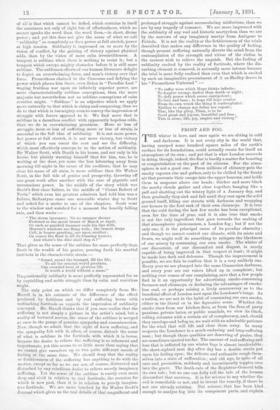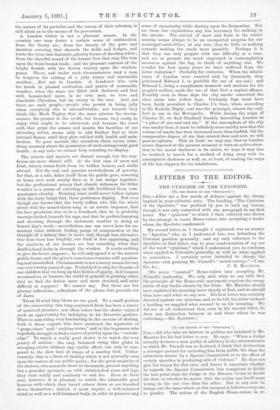FROST AND FOG.
THE winter is here, and once again we are sitting in cold and darkness. It is not every city in the world that, having usurped some hundred square miles of the earth's surface for its foundations, could actually create for itself an atmosphere of its own ; and yet that is what London succeeds in doing, though, indeed, the feat is hardly a matter for boasting or congratulation on the part of its citizens. For the atmo- sphere is not a good one. From millions of chimney-pots the smoky vapours rise and gather, only to be chilled by the frosty air that prevents their escape into the upper heavens, and holds them in suspense above our heads : thicker and more black the murky clouds gather and close together, hanging like a pall and shutting out the wintry light of a January day, and then gradually they sink and fall until they rest upon the solid ground itself, filling our streets with darkness and wrapping our houses in the foul reek of their own chimneys. It is true that the cold during the last few weeks has been exceptional, even for the time of year, and it is also true that smoke is not the only ingredient that goes towards the making of that atmospheric phenomenon, a London fog ; but if not the only one, it is the principal cause of its peculiar obscurity; and though we cannot control our climate, with its mists and frosts, we might well do something to mitigate the blackness of our misery by consuming our own smoke. The winter of our discontent, of our discomfort and disgust, is surely capable of being improved in that respect at least; it might be made less dark and dolorous. Though the improvement is possible, we are fain to confess that it is a very unlikely one. Every year we are plunged into the same Cimmerian darkness, and every year are our voices lifted up in complaint; but nothing ever comes of our complaining, save that a few people find in it an opportunity for advertising smoke-consuming furnaces and chimneys, or declaring the advantages of smoke- less coal, or perhaps raising a lively controversy as to the beneficial effect of London soot upon the Londoner's lungs. As a nation, we are not in the habit of consuming our own smoke, either in the literal or in the figurative sense. Whether the smoke rises from our kitchen-fires, or from the fires of party passions, private hates, or public scandals, we view its black, rolling columns with a certain air of complacency, and, should they envelope and befog us, we- wait with an admirable patience for the wind that will lift and clear them away. In many respects the Londoner is a much-enduring and long-suffering man ; but though those qualities are deserving of praise, they are sometimes carried too far. The amount of real suffering and loss that is inflicted by our winter fogs is almost incalculable : the short-sighted man day after day has a double strain put upon his failing eyes ; the delicate and asthmatic cough them- selves into a state of suffocation ; and old age, in spite of all care and precaution, suddenly and incontinently topples over into the grave. The death-rate of the Registrar-General tells its own tale ; but no one can fully tell the tale of the 'human discomfort that survives. It is for science to say whether the evil is remediable or not, and to invent the remedy, if there be not one already existing. But science, that has been kind enough to analyse fog into its component parts, and explain the nature of its particles and the reason of their cohesion, is still silent as to the means of its prevention.
A. London winter is not a pleasant season. In the country, one may derive a certain sense of exhilaration from the frosty air ; from the beauty of the pure and stainless covering that shrouds the fields and hedges, and turns the trees into fantastic, ghostly forms of dazzling white; from the cheerful sound of the horses' feet that ring like iron upon the frost-bound roads ; and the pleasant contrast of the ,bright fireside with the frozen tracery upon the window. panes. There, and under such circumstances, may a man ibe forgiven for talking of a jolly winter and seasonable weather. But not in London. A Londoner who rubs hie hands in pleased exultation, and prates of seasonable weather, when the ways are filled with darkness and foul with besmirched snow, is no true man, no true and 'charitable Christian, but an enemy to his race. And yet there are such people,—people who persist in being jolly when everybody else is uncomfortable; not because they think, like Mark Tapley, that the more adverse the circum- stances, the greater is the credit, but because they really do enjoy what ought to be abhorrent, and because the cruel cold, that grips the senses and numbs the faculties of our 'shivering selves, seems only to add further fuel to their internal flames, until they glow red-hot with health and satis- faction. To poor mortals like ourselves, there seems some- thing uncanny about the possession of such outrageously good health ; at any rate, we cannot help resenting its display.
The streets and squares are dismal enough, but the way- farers are more dismal still. At the first sign of snow and frost, misery comes forth from its hidden haunts, and stalks .abroad. Not the real and genuine wretchedness of poverty, for that, as a rule, hides itself from the public gaze, cowering at home over such scanty fires as it can scrape together; but the professional misery that almoit welcomes the bitter 'weather as a means of extorting an idle livelihood from com- passionate charity. Fainting want could never bellow hymns with the lusty lungs that these gentlemen display. But even though one knows that the burly ruffian who fills the whole .street with his unmelodious song is an arrant impostor, that this face proclaims him to be a drunkard, that he is probably warmly clothed beneath his rags, and that he prefers tramping and shouting through the inclement weather to doing an honest day's work,—nevertheless, one can never hear his un- musical voice without feeling pangs of compunction at the thought of a misery that is more real, though less obtrusive. 'Our fires burn less brightly, our food is less appetising, and the comforts of our houses are less consoling, when that death's-head looks in through the window. It avails nothing to give the brute sixpence ; he will only spend it at the nearest public-house, and the giver's conscience remains still question- ing and unsatisfied. Christmastide is not a merry season for any one over twenty years of age. Probably it is only for the sake of -our children that we keep up that fiction of gaiety. Is it because we ourselves, or because the world in general is growing older, that we find the fiction more and more strained, and more difficult to support ? We cannot say. But these are but -gloomy reflections ; reflections of the gloom that prevails out -of doors.
'Tie an ill wind that blows no one good. To a small portion of the community, this long-continued frost has been a source of unmixed pleasure; not often before has the skater enjoyed such an opportunity for indulging in his favourite pastime. There is something very fascinating in the exercise of skating, both to those experts who have mastered the mysteries of 4‘
grape-vines" and "rocking-turns," and to the beginners who hopefully struggle to find a centre of gravity upon the "outside- -edge." To watch a really good skater is to watch the very poetry of motion: the easy, balanced swing that glides in sweeping circles without any visible effort, can only be com- pared to the slow beat of wings of a soaring bird. Unfor- tunately, that is a form of skating which is not generally seen upon the waters of our public parks ; for the great majority of the-skaters, who assemble there in thousands, present anything but a graceful spectacle, as, with outstretched arms and legs, they rush wildly and aimlessly to and fro. Even in their -case, however, it is pleasant to watch the admirable good humour with which they knock others down or are knocked clown themselves ; indeed, it must require a well-balanced :mind as well as a well-balanced body, in order to preserve any sense of equanimity while skating upon the Serpentine. Nor are these two requisitions any less necessary for walking in the streets. The arrival of snow and frost in the winter months seems always to be an unexpected surprise for our municipal authorities; at any rate, they do little or nothing towards making the roads more passable. Perhaps it is that they can only grapple with one difficulty at a time, and are at present too much engrossed in contemplating measures against the fog, to think of anything else. We wonder for how many years we have suffered from the latter visitation ? Probably for centuries. When the inhabi- tants of London were counted only by thousands, they petitioned Edward I. to prohibit the use of sea-coal ; and Edward L, being a complaisant monarch and anxious for his people's welfare, made the use of that fuel a capital offence. Possibly even in those days the city smoke converted the river mists into yellow fogs. Certainly fogs must have been fairly prevalent in Charles L's time, when, according to Sir Kenelm Digby, coal was the principal, almost the only fuel in use in the Metropolis. While during the reign of Charles II., we find Shadwell frankly describing London as "a place of sea-coal and sin." If the atmosphere of the city was murky then, it must be infinitely more murky now that the volume of smoke has been increased more than tenfold. On the comparative degree of sin that existed then and now, we will pass no opinion. This at least we may say, that as London seems disposed at the present moment to turn an active atten- tion to the moral darkness in its midst, we hope it may also be inclined to search for a method of doing away with its atmospheric darkness as well, or, at least, of making the ways of life less slippery for its inhabitants.















































 Previous page
Previous page